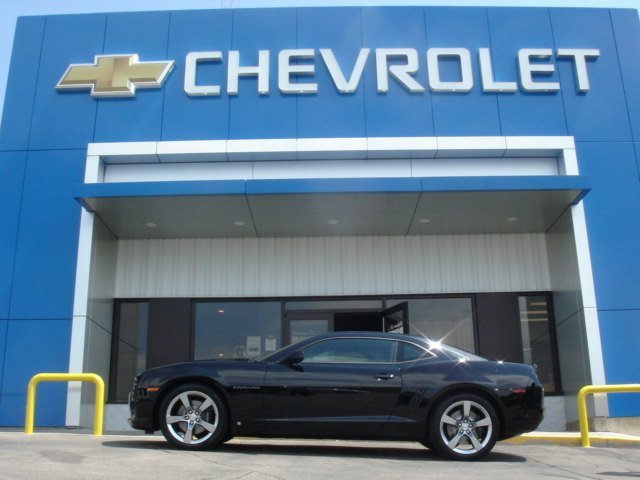May I Please Buy A Camaro Now?
Vijay Ravindran at the WaPo’s Achenblog details his own descent into Camaro buying hell:
“I wanted a Chevy Camaro.
I’d never really liked American sports cars before. But the 2010 Camaro — a revival Chevrolet has been talking up since 2006 — is so much more sleek than your typical muscle car. And since my BMW 330 started showing its age (nine) around the same time that the death of the U.S. auto industry hit the headlines, I thought: Why not do a little something to help?”
“So, after seeing a newspaper ad promoting Camaros at a local Chevy dealer, I called and left a voicemail saying I was interested in a test drive.
I never heard back.
I was shocked. Here I was, ready to buy, while GM was in financial straits. I thought they’d be all over me. Turns out it’s not so easy to obtain a piece of the American dream.”
Needless to say, the story doesn’t end here. Ravindran tries several dealerships and gets treated like, well, crap. Which begs the question: if a halo car brings people into the dealerships only to be disappointed, what’s the point?
More by Edward Niedermeyer































Comments
Join the conversation
I'm sorry, but anyone who says they were in sales and would never let a call go is full of crap. In sales, we had a little term called "qualification". You don't waste time on any customer who couldn't make a near term purchase, unless you were selling something unbelievably profitable, and you needed to groom them. There's no percentage in grooming a customer when your product availability is indeterminate. Particularly in retail, when the odds are very good that when the product is available, the sale will go to another salesman. One huge bit of the fault does lie with the automakers: allocation systems. For a car where the manufacturer is the source of the product's excitement, any dealer should be able to take an order for any car, and be put in the delivery queue, first come, first served. And the software to estimate delivery is easy enough without actually placing the order. So if a dealer has used their allocation, the sales people are completely de-incentivized to even discuss the vehicle in question. Unavailability of product is something that will result in a display of rude self interest after a very short period of time, because commissioned sales people are treated like absolute crap by everyone from their management to the president of the manufacturer. They are the bottom of the hierarchy in every company, and their only value lies in a "closed sale", which is reflected on their pay check. If it isn't even remotely possible to close a sale, even over a period of months (which the allocation system ensures at this time, even for "ordered" vehicles), please explain why someone would not give up on trying to be nice after the 100th person calls on the phone, not even walking into the dealership, looking for something that you can't help them with? To be sure, there are salesmen/women with the kind of people skills which allow them to ignore their own self interest and frustrations...but they tend to have the better, business to business sales jobs, not the retail kind in which car sales are a part. My experiences as a salesman in my younger years have left me with a self conscious avoidance of wasting the time of salesmen when they really can't help me. The Camaro is so good at what it is, that there is simply no place for a salesman to turn a Camaro sale into something else. If they have it in, they don't even have to try to sell it, it'll sell itself in a matter of hours unless the dealer is taking an added markup. I have never experienced some of the situations being relayed here. If I've gone into a car dealership, I look around the lot and see what I want, and I show an interest, the sales folk have been more than eager to help me close the sale. I only had problems when I wanted something they didn't have and couldn't get easily.
@ BuzzDog Good list. One query; Dealers lose out on impulse buys for the hot, new models ..... Is this real? Maybe there's a tiny % of impulse buyers, and I think that's the point; the whole dealership experience with their huge stocking costs seem setup precisely for a non-existent impulse buyer when in reality that just doesn't happen. I would think the vast majority of people research a purchase as significant as a car, or are buying on a well deserved dealer/manufacturer loyality. To add/expand on your list; ADVANTAGES: Manufacturers get to extend JIT to the end-user, resulting in an improvement in profitability. Unsold inventory is the single largest cost killer in manufacturing. Sustainable profit IS employment. DISADVANTAGES: There is an existential school of economic thought that says that you have to people in jobs to create exchanges of money to keep other people in jobs. So while it's possible for a productivity or economic efficiency zealot to argue nearly all retail jobs could be eliminated, what does that create??? Anyone who is a fan of the Hitch-Hiker's Guide to The Galaxy will know that the Earth is actually the planet where the useless third of another planet's population landed. Hairdressers, shoe salesman, management consultants, marketeers, telephone sanitizers etc. Funny stuff, but a bit to close to the bone....
@ Frankenbike: Thank you.